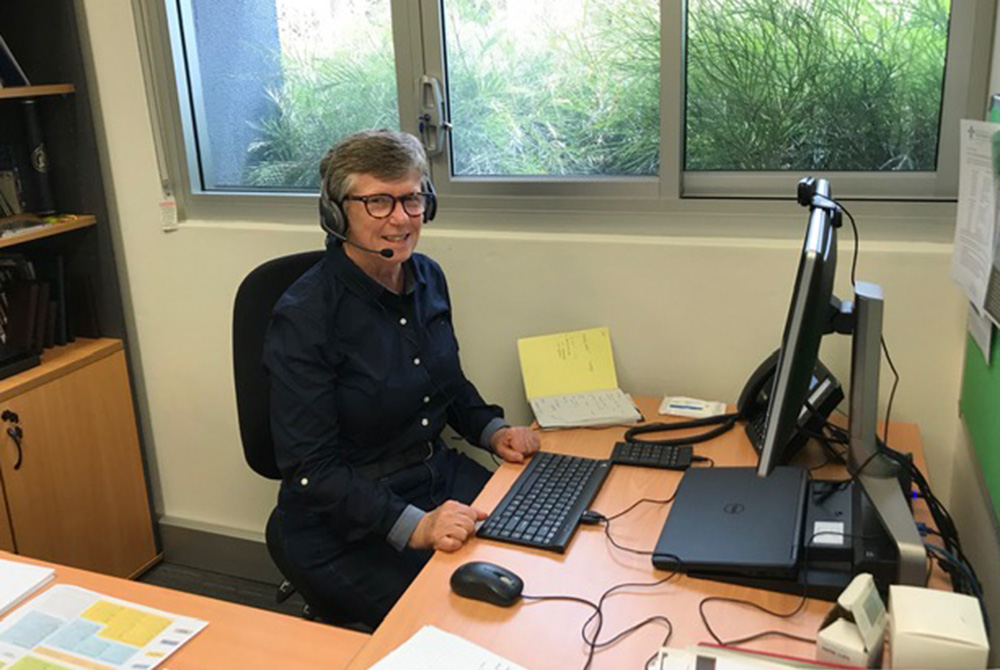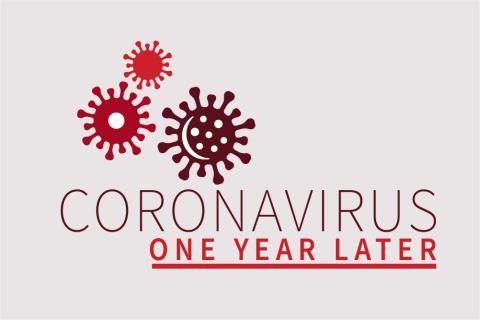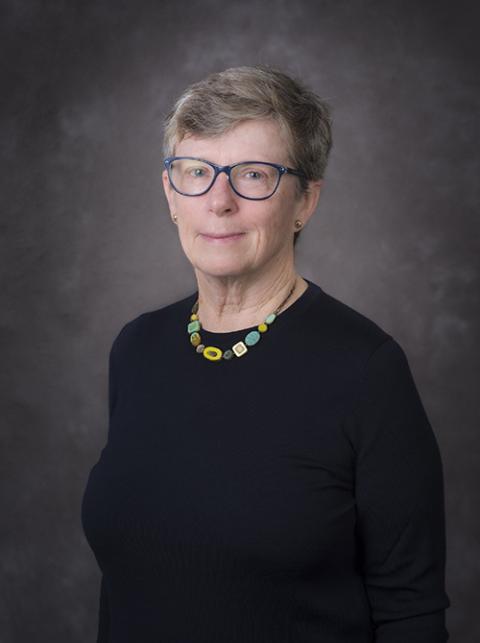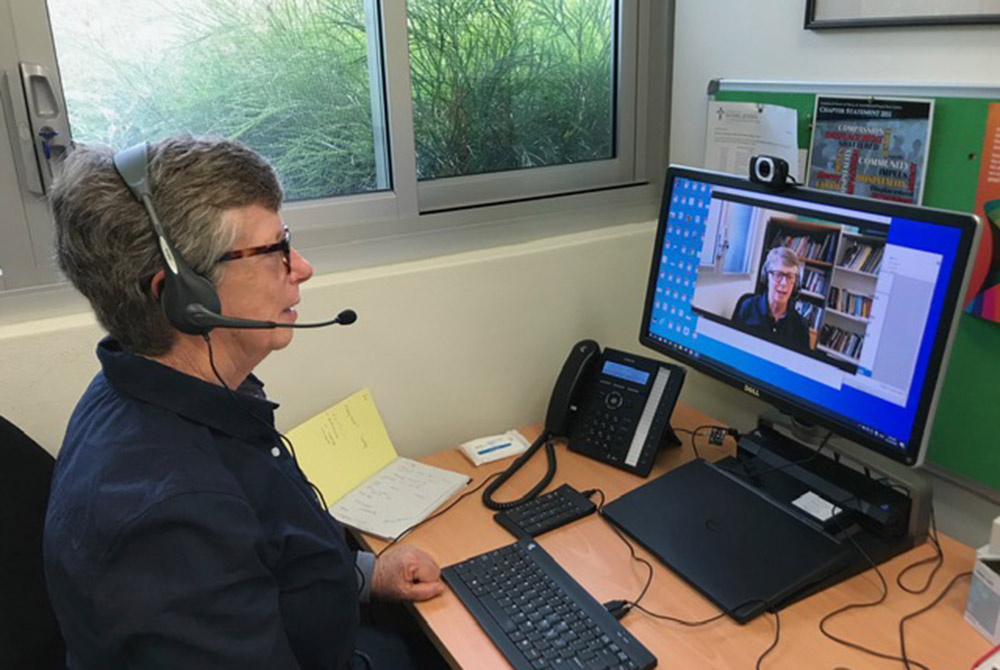
Sr. Maryanne Loughry at the Institute of Sisters of Mercy of Australia and Papua New Guinea offices in Lewisham, a suburb of Sydney, Australia (Courtesy of Sr. Maryanne Loughry)
Editor's note: On March 11, 2020, the World Health Organization said COVID-19 could be characterized as a pandemic. One year later, millions of lives have been lost to the virus, and people worldwide are taking stock of the last year and what the future holds. This week, Global Sisters Report looks at the impact of the pandemic on religious life with a special series, Coronavirus: One Year Later.

(NCR, GSR logo/Toni-Ann Ortiz)
Mercy Sr. Maryanne Loughry, a member of the Institute of the Sisters of Mercy of Australia and Papua New Guinea and a trained psychologist, has long led psychosocial and well-being trainings throughout the world, particularly among refugee communities. But in the last year, she has also been a sought-out figure to conduct webinars on ways of coping with the global pandemic.
Two of the more prominent webinars Loughry led for sisters were successive events that drew hundreds of viewers in April 2020, sponsored by the International Union of Superiors General. The first, held April 1, focused on ways to deal with anxiety and stress; the second, held April 21, dealt with facing social and personal grief.
These webinars were built on Loughry's 40-year ministry and a number of international affiliations: While working remotely from home in Sydney, Loughry remains a part-time faculty member of the Boston College School of Social Work and a research associate at the University of Oxford's Refugee Studies Centre. Loughry has worked with Jesuit Refugee Service and holds a doctorate in psychology from Flinders University of South Australia.
GSR: A year later, how are you, and how are the members of your congregation?
Loughry: In Australia, we are aware that with our borders closed, we have been saved from the large number of cases and deaths. But we are more aware how differently some of us have been impacted, especially our elderly and, if anything, how the pandemic has exposed our vulnerabilities, including the fact that we are an older population.
I am doing well and have enjoyed having more time back in Australia with my community. I do look forward to returning to some in-person work, including teaching, back in Boston when it is safe to do so. The time differences have meant I have been working early in the morning and late at night, and I look forward to more regular hours.

Sr. Maryanne Loughry of the Institute of Sisters of Mercy of Australia and Papua New Guinea (Courtesy of Boston College)
A year later, we hear a lot of talk about the "new normal." How do you assess what that means for sisters and their ministries?
There are two issues. The first is the dynamic of closing down: ministries that have had to be suspended or ended. Those ministries were a way of life for many sisters, especially older sisters, and it has been frustrating to have those closed down. There is still grieving going on. But one result — and this is the second issue — is that sisters have found more time to pray, and that has become even more meaningful in sisters' lives. I've heard from sisters all over the world, saying, "We're praying more."
I also think perhaps we're more mindful than we've ever been. I live in Sydney next to a soup kitchen. Those who are homeless literally eat on my doorstep, and I've been able to engage with people more deeply than before. That's been a great gift.
Here in Australia, we've been impacted by the pandemic, but not like Europe or the United States, so I have to be mindful that our challenges have not been as serious as elsewhere.
I contrast that with sisters working in countries like India, where the pandemic has added to challenges that were already there. I have the luxury of good internet connectivity; many sisters throughout the world do not have that, and that has made their work now all the more challenging.
Speaking of the internet and new ways of working, how has your work changed in the last year?
My congregation had already starting moving more things online even before the pandemic, so in many ways, the transition to a life more online has been relatively easy. That's resulted in events like 300 sisters from Australia praying together online, which is quite an experience!
People are keeping in touch like never before. People are there, and they are there for funerals or memorial services online, which are now being attended in such high numbers.
How do you think, a year later, people are coping in general?
If somebody was anxious, prone to anxiety, before the pandemic, I don't think this has helped them. This has challenged them in new ways. And it's been a real challenge for sisters who are extroverts, need that personal contact with people, or were driven by specific ministries that have either had to modify or close down. If your role or your purpose disappears, that's very difficult to cope with. People have had to find new purposes. Age, personality type, how you perceive your sense of purpose are all factors in how people have coped or not coped.

Sr. Maryanne Loughry at the Institute of Sisters of Mercy of Australia and Papua New Guinea offices in Lewisham, a suburb of Sydney, Australia (Courtesy of Sr. Maryanne Loughry)
Have people become numbed to this reality?
I don't think "numbed" is quite the right word, but people can become locked in their body with fear, and it takes human contact to unlock that. I think we have to reach out to each other. Even just having a chance to talk can be helpful.
Are there ways or habits of being that have perhaps not been helpful?
Taking precautions is absolutely necessary right now, but taking them out of too much fear can be paralyzing — where, in a communal dining situation, every piece of bread is wrapped in plastic, or where even kneeling during a socially distanced Eucharist is thought to be unsafe. Losing your confidence, being too tentative, panicking can be a real challenge right now.
But issues of confidence and comfort are also highly subjective: Some of us are more risk-takers than others. There are thresholds of comfort.
Overall, I think many people, not just sisters, have been in survival, panic mode, and in that mindset, you hunker down. It takes time and leadership to overcome that.
How do you assess the year underway compared to 2020?
I think the year offers particular challenges. We thought that when 2020 was over, we could move forward this year with a fresh start. The vaccine is most welcome, but looking at these new variants, I think people realize that even when they are vaccinated, the pandemic won't be over.
And in some ways, 2021 may be more challenging than last year. We've done our best, but the world is fatigued. People look exhausted. They are still challenged. And I don't think we can keep asking health professionals to do this work at such an unrelenting pace.
What permanent changes might we expect in terms of how sisters and the wider society live and work?
It's maybe too soon to say, but I do think more things will move online. Look at Eucharist: More and more people, including sisters, are experiencing that online, so we will have to see whether that experience becomes permanent. What will other things look like? I don't think we know yet, but I think many things will change.
Advertisement
As someone with much global experience, how do you assess the last year globally?
Well, the focus in much of the media is on the wealthier nations. What's COVID-19 like in Yemen? In Jakarta [the capital of Indonesia]? We know more of what it's been like in Chicago. That's why I've been reluctant to talk about Sisters — sisters with a capital S — globally. I know about the pandemic largely through my own setting, privileged position.
I should mention my congregation has sisters in Papua New Guinea, and we have been unable to travel to be with them, and even sending them material has been a challenge. We have had to find ways to support them and enable them remotely, by text, phone call and internet. We also know that the country's health care system could easily be overwhelmed, and we are concerned for our sisters' well-being as well as their ministries. They are a sign of great resilience in adversity, and it is important for us to recognize their resilience as a source of inspiration.
Has there been any gift or grace in this moment?
I think people are engaged in small acts of kindness. I know that I am more mindful than I used to be. I mentioned the soup kitchen. Whenever I bump into volunteers there, I thank them, and in the past, I might have walked right past them. I am inspired by people like that.
What have been your own resources during this last year?
I've had more opportunity to read — good, quality novels, spiritual and artistic work — and that has been enormously beneficial and more spiritually sustaining than Netflix. I've had more time for prayer and reflection, and that has been sustaining. It's also been a time to see what a gift I've been given in religious life.





